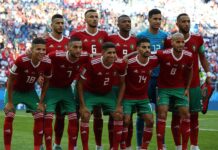
No African football competition has better echoed the biblical story of David and Goliath than this edition of the Africa Cup of Nations (AFCON).
Joel Omotto, bird story agency
The story of Africa’s smaller teams felling the continent’s football giants continues, turning the event in Ivory Coast into one of the most exciting for fans, ever.
Before the start of the competition, Senegal, Morocco, Nigeria, Cameroon, Egypt, Algeria, Tunisia and Ghana were among those tipped to win it but at the halfway point of knockout matches, only three “powerhouses”, remain.
Algeria, Tunisia and Ghana did not even make it past the group stage, while Cameroon and Egypt, who sneaked into the knockout round, were eventually found out and sent packing.
Equatorial Guinea, a nation of just 1.7 million people, finished top of a Group A that included Nigeria and Ivory Coast, while Cape Verde, the island nation whose population is only around 600,000, were Group B winners ahead of Egypt and Ghana.
Equatorial Guinea started by holding Nigeria to a 1-1 draw, then beat Guinea-Bissau 4-2 before the statement 4-0 thrashing of hosts Ivory Coast. They then held their own in the Round of 16 against Guinea before conceding a last-minute goal to exit the competition.
Meanwhile, Cape Verde stunned Ghana 2-1 and thrashed Mozambique 3-0 before a 2-2 draw with Egypt, while Mali, a country that has not enjoyed political stability for years – seemed to be getting it right in football as they topped a Group E that included South Africa, Tunisia and Namibia – beating Bafana Bafana and drawing with the other two.
Then there is Mauritania and Namibia. Mauritania had never scored a goal at the AFCON since their first appearance in 2019 but at their third straight tournament, they not only scored three but also won a match.
Mauritania’s victory was the memorable 1-0 triumph over 2019 champions Algeria which sent the North Africans crashing from the group stage in a second successive tournament while sealing Mauritania a place in the knockout round for the first time in their history.
Namibia, meanwhile, started by felling giants Tunisia with a 1-0 win, and even after a heavy 4-0 defeat to South Africa, drew with Mali to seal a historic place in the knockout round where they then met their Waterloo, suffering a 3-0 loss to Angola.
The ‘rise of the minnows’ is no fluke, however. These impressive results are the product of an increasingly professional approach to the game, with well-laid-down strategies, thoughtful tactics and self-belief providing the rocket fuel the teams have needed to propel them past their stories peers.
“We are showing the world that we will have to count Cape Verde in this AFCON as one of the best-performing teams. No matter who our opponent is, we are not afraid of anyone, and we will do everything to achieve this goal,” said Cape Verde coach Pedro Leitao Brito, popularly known as Bubista.
Equatorial Guinea and Cape Verde made good use of their foreign-born players, the former with 17 and the latter with 14.
The players are coming to the tournament with attitudes and training honed in countries with world-class facilities, while a number of the smaller countries have proven attractive destinations for world-class players. Spanish-born Equatorial Guinea captain, Emilio Nsue, for example, led the scoring charts at the tournament with five goals at the time of their exit, while Portuguese-born Bebe was the architect of Cape Verde’s impressive run.
While the likes of Ghana, Cameroon, Ivory Coast, Egypt and Zambia pay the price for questionable appointments in the dugout, lesser know footballing nations are reaping the benefits of good decision making.
The way Equatorial Guinea ran Ivory Coast ragged in front of the home nation’s fans, Cape Verde’s easy win against Ghana and the bravery of Mauritania against Algeria all showed smaller teams outsmarting the bigger names by hiring coaches who got their tactics spot on while instilling self-belief into their players.
“We had a great match tactically; we knew they were going to try to press us. We said to ourselves that if we resisted the first 15 minutes, the match would be for us,” Equatorial Guinea goalkeeper Jesus Owono revealed after their big win over the AFCON 2023 hosts.
It was also surprising that leading by one goal against one of the best teams in the tournament, Mauritania opted to keep attacking, even with the game almost over when most teams in their position would have been defending their slim lead.
“I told my players to not leave anything out, to believe until the final whistle and we saw all the scenarios we had in those conversations and we had seen other teams and we have been able to win against this Algerian team,” Mauritania’s French-born Comorian coach Amir Abdou told the media after the match.
For a country like Mauritania, this means a lot after years of work behind the scenes. Largely covered by desert, the country never won a match between 1995 and 2003 and withdrew from the 2010 AFCON qualifiers due to financial constraints.
At the time, they were ranked 206 in the world, behind Bhutan, San Marino and the Turks and Caicos Islands.
However, in 2014 things started looking up when they won their first match and decided to restructure the league, build ultra-modern facilities and invest in youth programmes.
The 2023 tournament is not nearly over but has already delivered the best AFCON ever and has acted as a reminder to the sleeping giants of African football that the story will likely be the same, or worse, at the 2025 edition in Morocco, if big changes are not made, soon.
bird story agency


